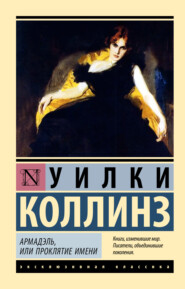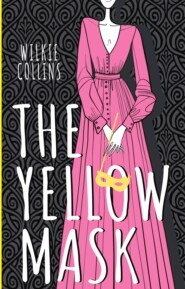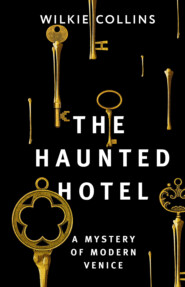По всем вопросам обращайтесь на: info@litportal.ru
(©) 2003-2025.
✖
The Woman in White / Женщина в белом
Настройки чтения
Размер шрифта
Высота строк
Поля
The End of Hartright’s Narrative.
The Story Continued by Vincent Gilmore (of Chancery Lane,[47 - of Chancery Lane – из Ченсери-Лейн] Solicitor)
I write these lines at the request of my friend, Mr. Walter Hartright. Mr. Hartright decided to present the story to others, in the most truthful and most vivid manner.
I was present during the living of Sir Percival Glyde in Cumberland, and was personally concerned in one important result of his short residence under Mr. Fairlie’s roof. It is my duty, therefore, to add these new links to the chain of events.
I arrived at Limmeridge House on Friday the second of November.
My object was to remain at Mr. Fairlie’s until the arrival of Sir Percival Glyde. But Mr. Fairlie had been, or had fancied himself to be, an invalid for years past, and he was not well enough to receive me.
I did not see Miss Fairlie until later in the day, at dinner-time. She was not looking well, and I was sorry to observe it. She is a sweet lovable girl, amiable and attentive to everyone.
Miss Halcombe was the first member of the family whom I saw. She met me at the house door, and introduced me to Mr. Hartright, who had been staying at Limmeridge for some time past. Mr. Walter Hartright, the art teacher, seemed a very pleasant young man. I was informed that Mr. Hartright was leaving the next day. Marian also told me about the business of the letter which Laura had received, and how helpful Mr. Hartright had been to her about that. I told them that I would send a copy of the letter to Sir Percival.
On Saturday Mr. Hartright had left before I got down to breakfast. I took a walk by myself in the afternoon, and looked about at some of the places.
I’ve been a lawyer to the Fairlie family for many years. I knew Laura’s father, Mr. Philip Fairlie, very well, and I’ve known Marian and Laura since they were children. I’m very fond of them both, and I was most anxious to make a good marriage settlement for Laura. Laura, I’m sorry to say, didn’t look well – not like her usual happy self at all. She played the piano to us that evening, but she made a lot of mistakes.
At two o’clock Mr. Fairlie sent to say he was well enough to see me. He had not altered since I first knew him. His talk was to the same purpose as usual – all about himself and his ailments, his wonderful coins, and his Rembrandt etchings.
The moment I tried to speak of the business that had brought me to his house, he shut his eyes and said I “upset” him.
* * *
The rest of the weekend passed quietly and on Monday Sir Percival Glyde arrived. I found him to be a most charming and friendly man, so far as manners and appearance were concerned. He looked rather older than I had expected. I have seldom met such a charming and friendly man. When we were introduced, I found his manner so easy and pleasant that straight away we got on together like old friends.
However I was surprised to see that Laura didn’t seem very happy to see him. After his arrival, she left the room as soon as she could politely do so, leaving Marian and I to speak with Sir Percival.
Miss Fairlie was constrained and uneasy in his presence. Sir Percival neither noticed the restraint in her reception of him, nor her sudden withdrawing from our society.
As soon as the door had closed behind Laura, Sir Percival brought up the business of the letter. He had received the copy which I had sent him and, as I had expected, he had a very satisfactory explanation. He had stopped in London on his way from Hampshire, had read the documents forwarded by me, and had travelled on to Cumberland, anxious to satisfy our minds by the speediest and the fullest explanation that words could convey. I offered him the original letter, which I had kept for his inspection. He thanked me, and declined to look at it, saying that he had seen the copy, and that he was quite willing to leave the original in our hands.
He told us that several years ago he had had a servant called Mrs. Catherick who was excellent in every way and had provided him with loyal and faithful service through difficult times. She had been doubly unfortunate in being married to a husband who had deserted her, and in having an only child whose mental faculties had been in a disturbed condition from a very early age. Her daughter’s name was Anne. Yes, unfortunately there was something wrong with her mind – so that she didn’t behave like a normal person. These problems got so bad that in the end her mother could no longer look after her at home.
* * *
Sir Percival offered to help by finding and placing Anne in an excellent Asylum where people would be kind to her and where she would be well looked after. It was expensive to keep Anne in the Asylum, but because of Mrs. Catherick’s loyal service to him, he offered to pay the money.
Unfortunately Anne had found out that Sir Percival had had something to do with placing her in the Asylum. He had done his duty to the unhappy young woman. But Anne hadn’t understood that he was acting out of kindness to help her mother and herself. She hated him because he had placed her there so she had written the letter to Laura.
I was the first to speak in answer to this appeal. When Sir Percival had finished, I said, “Now everything is very clear and I understand completely. Thank you, Sir Percival. How kind of you it was to help Mrs. Catherick’s poor daughter.”
The Story Continued by Vincent Gilmore (of Chancery Lane,[47 - of Chancery Lane – из Ченсери-Лейн] Solicitor)
I write these lines at the request of my friend, Mr. Walter Hartright. Mr. Hartright decided to present the story to others, in the most truthful and most vivid manner.
I was present during the living of Sir Percival Glyde in Cumberland, and was personally concerned in one important result of his short residence under Mr. Fairlie’s roof. It is my duty, therefore, to add these new links to the chain of events.
I arrived at Limmeridge House on Friday the second of November.
My object was to remain at Mr. Fairlie’s until the arrival of Sir Percival Glyde. But Mr. Fairlie had been, or had fancied himself to be, an invalid for years past, and he was not well enough to receive me.
I did not see Miss Fairlie until later in the day, at dinner-time. She was not looking well, and I was sorry to observe it. She is a sweet lovable girl, amiable and attentive to everyone.
Miss Halcombe was the first member of the family whom I saw. She met me at the house door, and introduced me to Mr. Hartright, who had been staying at Limmeridge for some time past. Mr. Walter Hartright, the art teacher, seemed a very pleasant young man. I was informed that Mr. Hartright was leaving the next day. Marian also told me about the business of the letter which Laura had received, and how helpful Mr. Hartright had been to her about that. I told them that I would send a copy of the letter to Sir Percival.
On Saturday Mr. Hartright had left before I got down to breakfast. I took a walk by myself in the afternoon, and looked about at some of the places.
I’ve been a lawyer to the Fairlie family for many years. I knew Laura’s father, Mr. Philip Fairlie, very well, and I’ve known Marian and Laura since they were children. I’m very fond of them both, and I was most anxious to make a good marriage settlement for Laura. Laura, I’m sorry to say, didn’t look well – not like her usual happy self at all. She played the piano to us that evening, but she made a lot of mistakes.
At two o’clock Mr. Fairlie sent to say he was well enough to see me. He had not altered since I first knew him. His talk was to the same purpose as usual – all about himself and his ailments, his wonderful coins, and his Rembrandt etchings.
The moment I tried to speak of the business that had brought me to his house, he shut his eyes and said I “upset” him.
* * *
The rest of the weekend passed quietly and on Monday Sir Percival Glyde arrived. I found him to be a most charming and friendly man, so far as manners and appearance were concerned. He looked rather older than I had expected. I have seldom met such a charming and friendly man. When we were introduced, I found his manner so easy and pleasant that straight away we got on together like old friends.
However I was surprised to see that Laura didn’t seem very happy to see him. After his arrival, she left the room as soon as she could politely do so, leaving Marian and I to speak with Sir Percival.
Miss Fairlie was constrained and uneasy in his presence. Sir Percival neither noticed the restraint in her reception of him, nor her sudden withdrawing from our society.
As soon as the door had closed behind Laura, Sir Percival brought up the business of the letter. He had received the copy which I had sent him and, as I had expected, he had a very satisfactory explanation. He had stopped in London on his way from Hampshire, had read the documents forwarded by me, and had travelled on to Cumberland, anxious to satisfy our minds by the speediest and the fullest explanation that words could convey. I offered him the original letter, which I had kept for his inspection. He thanked me, and declined to look at it, saying that he had seen the copy, and that he was quite willing to leave the original in our hands.
He told us that several years ago he had had a servant called Mrs. Catherick who was excellent in every way and had provided him with loyal and faithful service through difficult times. She had been doubly unfortunate in being married to a husband who had deserted her, and in having an only child whose mental faculties had been in a disturbed condition from a very early age. Her daughter’s name was Anne. Yes, unfortunately there was something wrong with her mind – so that she didn’t behave like a normal person. These problems got so bad that in the end her mother could no longer look after her at home.
* * *
Sir Percival offered to help by finding and placing Anne in an excellent Asylum where people would be kind to her and where she would be well looked after. It was expensive to keep Anne in the Asylum, but because of Mrs. Catherick’s loyal service to him, he offered to pay the money.
Unfortunately Anne had found out that Sir Percival had had something to do with placing her in the Asylum. He had done his duty to the unhappy young woman. But Anne hadn’t understood that he was acting out of kindness to help her mother and herself. She hated him because he had placed her there so she had written the letter to Laura.
I was the first to speak in answer to this appeal. When Sir Percival had finished, I said, “Now everything is very clear and I understand completely. Thank you, Sir Percival. How kind of you it was to help Mrs. Catherick’s poor daughter.”
Вы ознакомились с фрагментом книги.
Приобретайте полный текст книги у нашего партнера:
Приобретайте полный текст книги у нашего партнера:

















